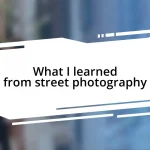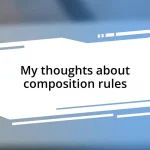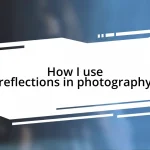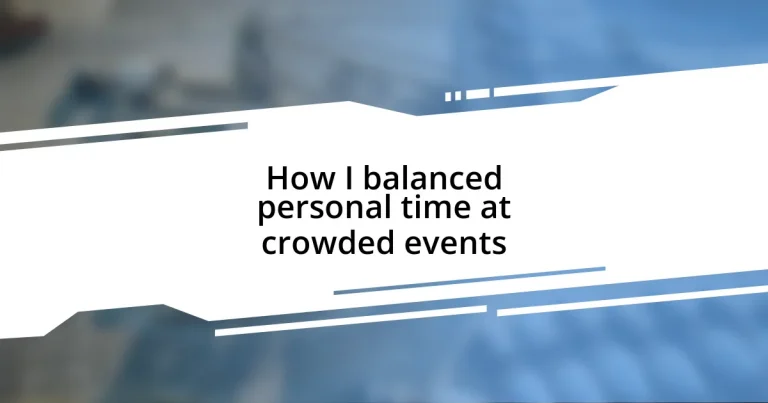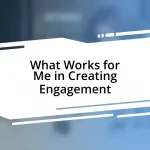Key takeaways:
- Recognizing personal limits and taking breaks during crowded events can significantly enhance overall enjoyment and reduce overwhelm.
- Setting clear boundaries for socializing and utilizing time management strategies, like alarms, helps maintain energy levels.
- Engaging in mindfulness practices, such as focusing on breath and deep conversations, fosters deeper connections and reduces stress.
- Reflecting on past experiences and journaling enables personal growth and the development of strategies for future gatherings.
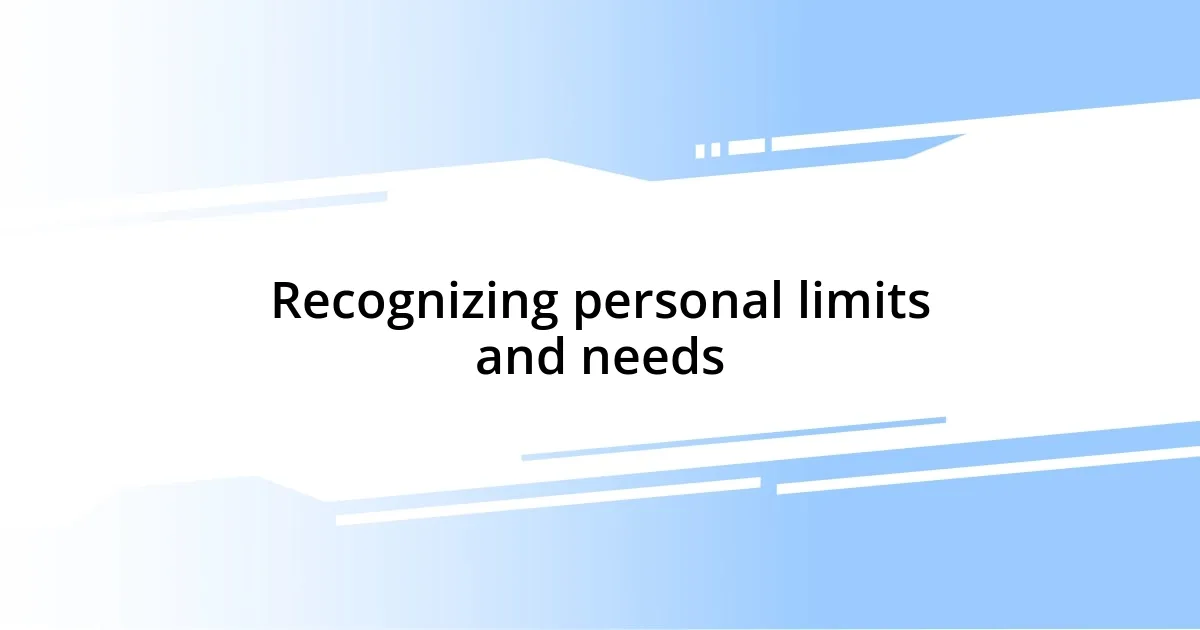
Recognizing personal limits and needs
Recognizing personal limits and needs is crucial, especially in the midst of a bustling event. I remember attending a large festival once, overwhelmed by the crowd and noise. It hit me — I needed a moment away from the chaos to recharge, but how many people actually take that time for themselves during such high-energy occasions?
Have you ever felt a sinking feeling amidst laughter and chatter, realizing you’re past your comfort zone? I’ve been there, too, and it’s a gentle reminder of the importance of tuning into our bodies and emotions. I learned to gauge my energy levels, recognizing that stepping away from the crowd to find a quiet corner can transform my experience completely.
Sometimes, acknowledging that I need a break is a bit of a mental battle. But I’ve discovered that checking in with myself, asking questions like, “Am I enjoying this? How am I feeling right now?” helps clarify my needs. It’s empowering to realize that it’s okay to place my well-being above social expectations; in fact, doing so can lead to a more fulfilling experience overall.
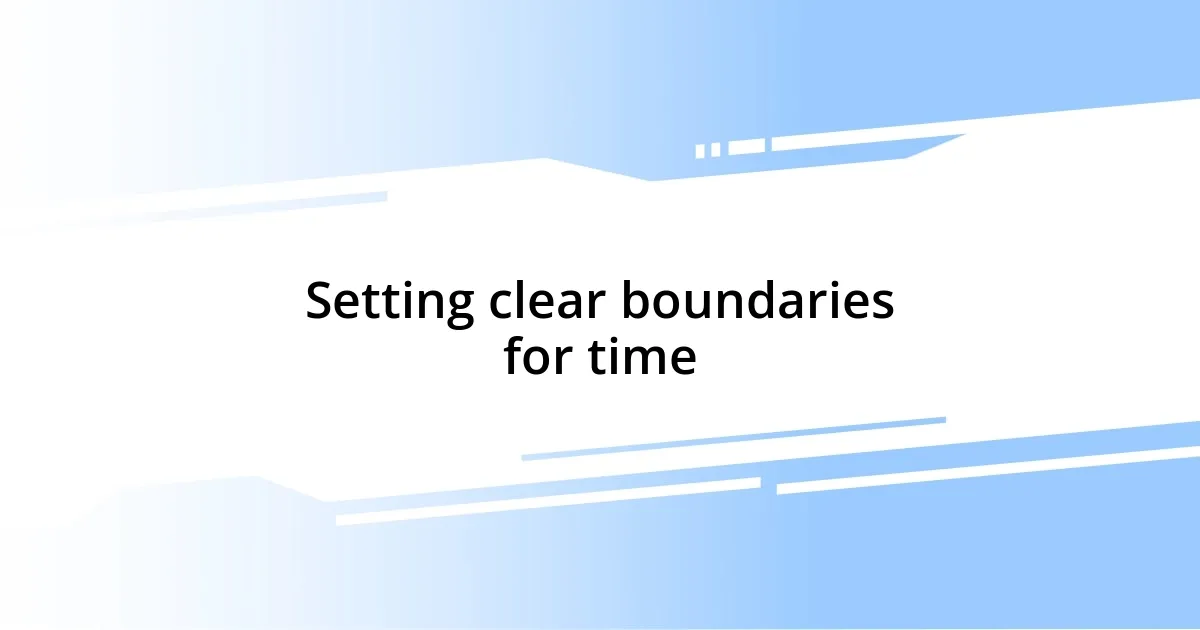
Setting clear boundaries for time
Setting clear boundaries for time is an essential skill when navigating crowded events. I’ve learned that specifying the duration I spend in social situations helps me maintain my energy. For instance, I’ll often set an alarm on my phone to signal when it’s time to take a break. It may sound simplistic, but having that reminder allows me to enjoy the event while also respecting my personal limits.
Creating time slots for both socializing and unwinding can transform your experience. For example, I once went to a concert where I designated an hour for mingling and another for retreating to a quieter space. This strategy not only relieved my anxiety but also allowed me to engage more thoughtfully with the people I was around. Sharing moments with friends became more enjoyable when I honored my need for balance.
Establishing boundaries takes practice, and it can feel awkward initially, especially if friends are not used to you prioritizing your needs. I remember a time when I told a friend I needed a 15-minute breather at a party. She was surprised but ultimately appreciated my honesty. In my experience, being upfront about my needs fosters mutual respect. When you set clear boundaries, it opens a dialogue about self-care that others can also adopt.
| Strategy | Description |
|---|---|
| Time Setting | Use alarms or timers to plan breaks. |
| Designated Slots | Set specific times for socializing and calming down. |
| Communication | Be open about your boundaries with others. |
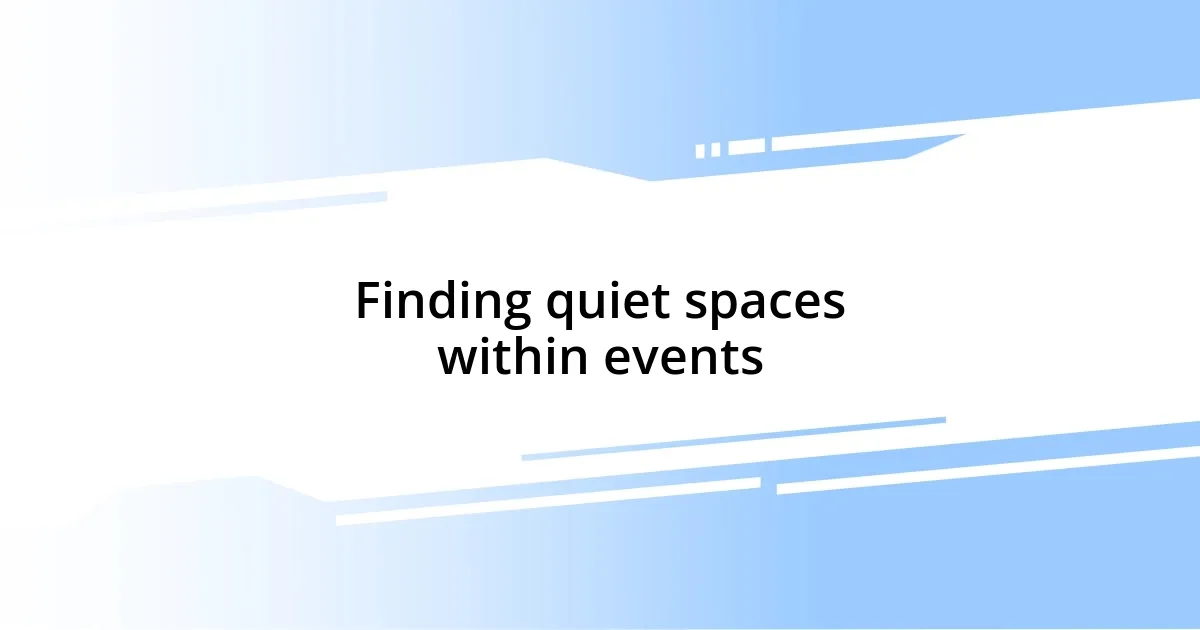
Finding quiet spaces within events
Finding a quiet corner amid the festivities can feel like a small victory. I recall one particular wedding where the joyfulness of my friends was infectious, yet the noise began to overwhelm me. I slipped away to the patio, allowing the cool breeze to wash over me. In that moment of solitude, I was able to recharge, ultimately returning to the celebration with renewed energy and a better mindset.
Here are a few strategies to help you discover those peaceful spots:
- Scout the Venue: Before the event starts, take a moment to identify potential quiet areas. Look for less-trafficked locations, like gardens or lounges.
- Listen for the Calm: If the venue has breakout rooms or lounges, head there when it feels too chaotic. Often, even a short time in a quieter space can provide relief.
- Utilize Nature: Outdoor events are perfect for finding those serene spaces. A nearby grove or quiet bench can be a sweet escape from the noise.
- Timing is Everything: Specific times during the event, like right after dinner or during performances, can be quieter moments to take a short breather.
Being intentional about finding those quiet spaces can shift your entire experience, allowing you to feel connected while still honoring your need for personal time.
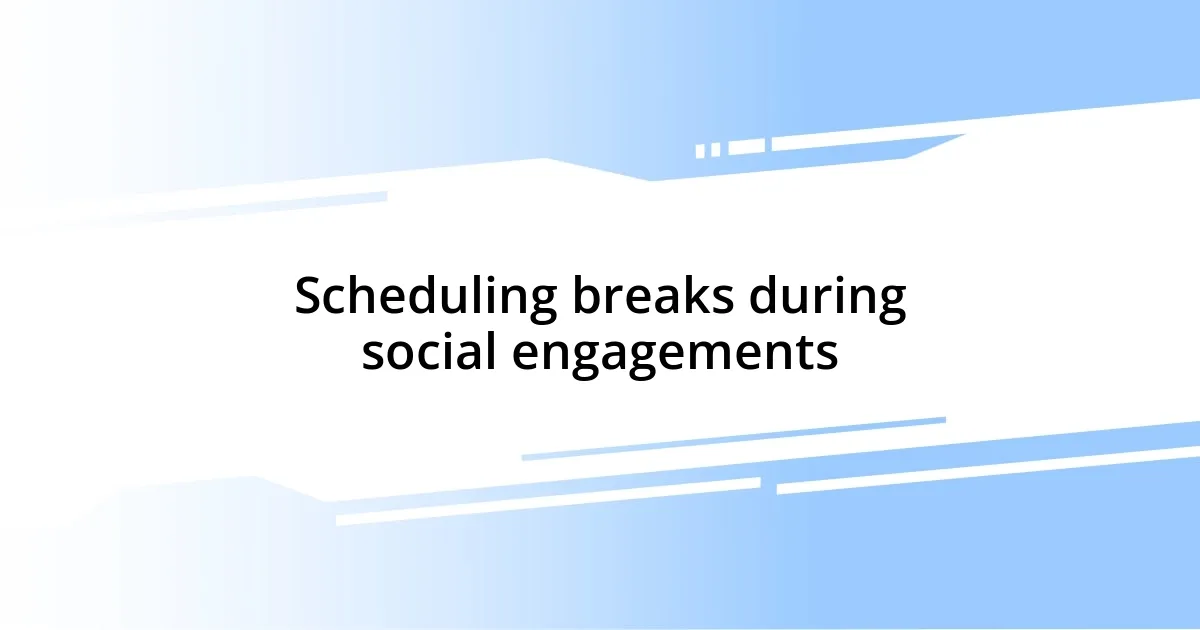
Scheduling breaks during social engagements
Scheduling breaks during social engagements can be a game-changer for maintaining your personal well-being. I remember a particularly bustling holiday party where I felt the familiar jitters creeping in. I decided to carve out 10-minute breaks every hour to step outside for some fresh air. Not only did those short respites keep my stress levels in check, but they also allowed me to return to the festivities feeling more refreshed and present for meaningful conversations.
Sometimes, visualizing how a break can enhance your experience makes it easier to implement. For example, I often use breaks as a chance to mentally prepare for the next round of socializing. I have a habit of finding a cozy spot—maybe a quiet corner at a café or a balcony at a friend’s home—where I can check in with myself. Have you ever stopped to reflect on how those brief moments of solitude can help you process the energy around you? I find that even a few minutes of mindfulness can refocus my thoughts and give me the energy to dive back into the group with a more open heart.
To make scheduling breaks a part of your social routine, consider integrating them into your overall plan for the event. I use a simple method: after making plans, I’ll add break reminders in my calendar. These serve as not just alarms, but as gentle nudges to prioritize self-care amidst the excitement. By proactively establishing this habit, I’ve noticed I enjoy events more, forging deeper connections without the emotional exhaustion that often follows large gatherings. How do you keep your energy balanced during social occasions?
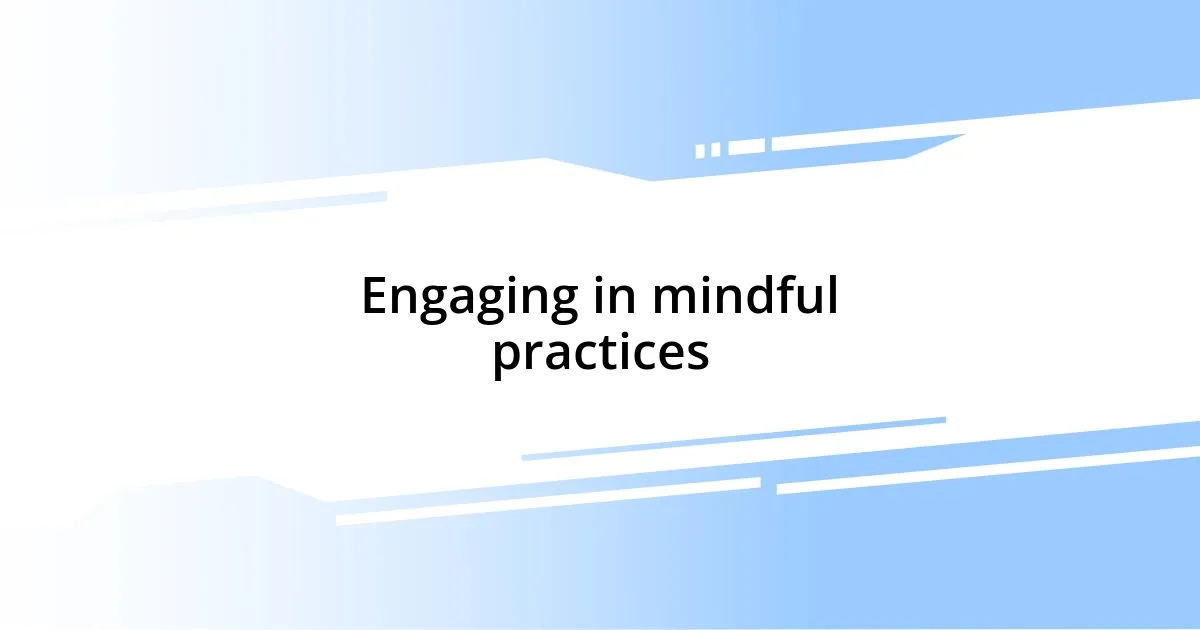
Engaging in mindful practices
Practicing mindfulness can transform how you experience crowded events. When I find myself in the middle of a bustling gathering, I often take a moment to focus on my breath. Inhale… hold… and exhale. This simple practice helps anchor me amidst the chaos. Have you ever paused to notice how the rhythm of your breath can influence your state of mind? It’s fascinating how something so fundamental can bring clarity and calm.
Another effective approach I’ve found is bringing a mindful intention to my interactions. At a friends’ reunion last summer, instead of flitting from conversation to conversation, I chose to fully engage with just one person at a time. I listened actively, making a conscious effort to cherish their words and feelings. That deep connection made the experience more fulfilling for both of us. Isn’t it rewarding to build quality connections in a sea of conversations?
I also advocate for integrating small mindful practices into the event itself. For instance, during a recent family gathering, I took a few seconds to savor a bite of dessert, fully immersing myself in the flavors and textures. This not only enhanced my enjoyment but also cultivated a sense of gratitude in that busy atmosphere. How often do we rush through moments without truly experiencing them? By practicing this awareness, I find events become less overwhelming and more enriching.
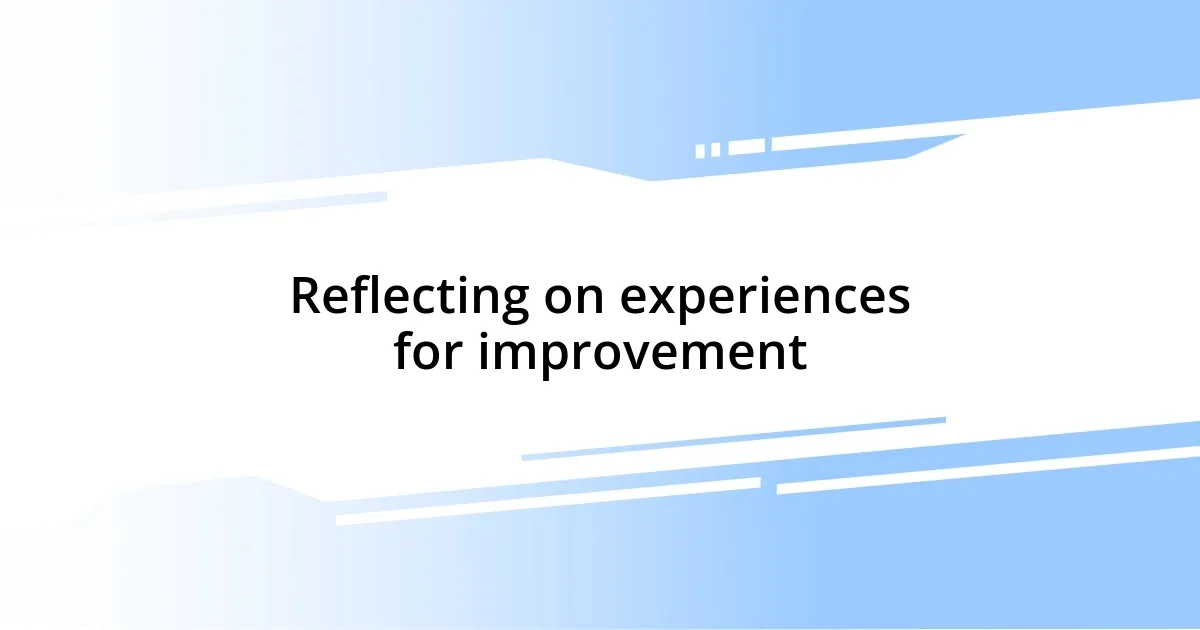
Reflecting on experiences for improvement
Reflecting on experiences has been key to refining my approach to crowded events. After a particularly overwhelming concert last year, I took time to think about what made it challenging. I realized that though the excitement was palpable, I had neglected to pay attention to my limits. It’s amazing how looking back can illuminate patterns that help in planning better for future gatherings. Have you ever analyzed why certain events drained you while others made you feel invigorated?
In my own journey towards improvement, journaling has become a pivotal tool. I often jot down my thoughts after an event, considering what went well and what felt taxing. For instance, after a large family wedding, I noted how mingling felt exhilarating initially, but that it quickly led to mental fatigue. By documenting these mixed emotions, I can craft strategies, like designating quieter spaces for recharge, that serve me better next time. Isn’t it intriguing how capturing our feelings can foster a more personalized experience at social outings?
I also believe in discussing my reflections with friends. Just last month, I shared my thoughts about an overcrowded marketplace with a good friend who experiences similar feedback. Our conversations helped me realize that voicing these experiences not only validates my feelings but also opens doors for new strategies. It’s like a two-way street where we can brainstorm ways to support each other during overwhelming social occasions. Have you ever considered how dialogue about your experiences can lead to shared insights and growth?

